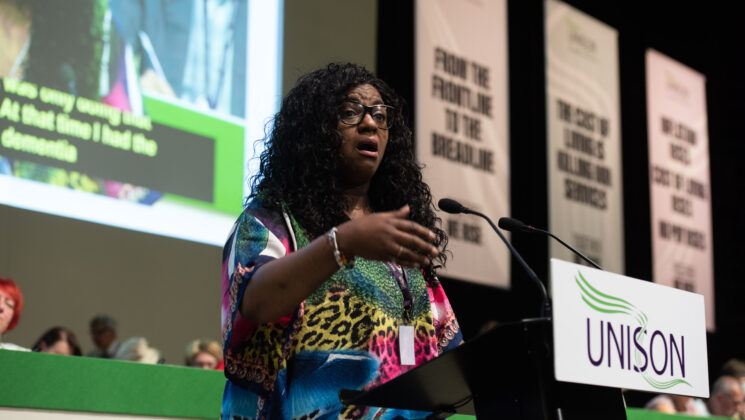On the second day of UNISON’s national delegate conference, the union unanimously voted through a motion to campaign for a national care service.
The COVID-19 pandemic has had a severe impact on the social care sector and care workers. Tens of thousands of elderly and disabled people have died from COVID-19 in care homes and other care settings across the UK since March 2020, and the death rate among care workers has been particularly high.
UNISON believes that the UK needs a national care service that brings about consistent standards of care for the elderly and disabled, and consistent terms and conditions for the workforce.
Introducing the motion, UNISON NEC member Helen Davis described how people are leaving care work for cleaning work due to the poor conditions.
Ms Davis urged members to ensure that calls for a national care service did not result in “a race to the bottom in the treatment and pay of workers.”
Gilly Anglin-Jarrett, East Midlands regional delegate, introduced an amendment to the motion that would document the union’s concerns about any responsibility for social care belonging to quangos, who would implement a market-based system. She said: “the care sector is a profession, and councils and providers have tried to de-professionalise that role.”
Ms Anglin-Jarrett described how, during the pandemic, she supported care workers who had tested positive for COVID-19 yet were told by employers that they would not be paid.
Elizabeth Cameron (pictured), speaking in support of the motion on behalf of the National Black Members Committee, described her own experiences as a care worker, and how much physical risk is involved in the job: “It’s common to find yourself with bruises, and to be harmed by the person you’re caring for and looking after.”
Polly Smith, from the local government service group executive, also spoke of her experiences as a home care worker: “Some service users can become aggressive. I’ve been scratched, bitten, had three bruised ribs, a bad hip and that’s only one service user. I can work up to 15 hours a day. During the pandemic I worked much longer without any real breaks, day after day, week after week.”
“I don’t get paid sick pay, I don’t get paid for training, and when I want a new uniform, I have to pay for that too.”The motion was unanimously carried by conference.


